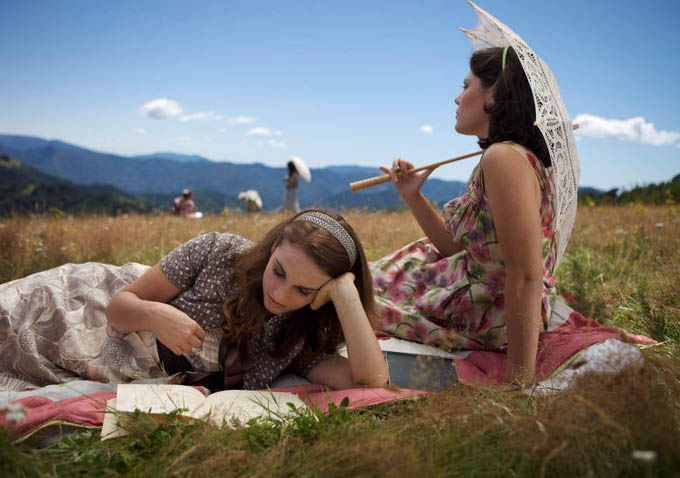
There are moments, while watching a movie for the first time, when you feel like your attention span is being stretched. It’s normal—it happens all the time. And in this day and age it’s more rare if you’re not thinking about five things at once than if you’re just thinking about one or two. Roger Ebert once said that a sign of a truly great film is when it makes you completely forget about everything, and glues you to the screen from start to finish. It’s great when you feel truly invested in the story, and there’s nothing anyone can do to stop you from watching how it ends. On the other hand, some movies make you wish for just about any kind of disaster—electrical power failures, building fires, hurricanes—to stop you from getting to the end. Yes, some movies stretch the attention span as if it was on a medieval torture rack until you become almost hysterical, bursting into fits of laughter, because some movies aren’t even worth the tears. As gorgeous as it looks, and as pleasant as it sounds when no one is speaking, Rosa Karo‘s “The Italian Key” is unfortunately part of the latter category.
The film follows a young orphan girl named Cabella (Gwendolyn Anslow) whose caretaker Max falls ill and dies, leaving her with an envelope and not a penny more. She’s told that the contents of the envelope, an ancient key and an address in Italy, will help her discover her mysterious past. Having no one else in the world, and curious about her birth parents ever since she could remember, Cabella decides to follow her heart and travel to Italy. After a delightful Italian locksmith tells her how ancient the key truly is, he directs her to the address, which happens to be in a village also named Cabella! Once she gets to the address, the key opens the doors to a rustic, abandoned house. Cabella starts to take things day by day. She quickly befriends Maria (Joana Cartocci) and her two sisters, Giulia (Isadora Cartocci) and Sophia (Elisa Cartocci), who tell her about the interesting locals around town. Lord Jai (Moose Ali Khan) is an Indian aristocrat who has moved to the village for reasons of his own. Maria works as one of his many housemaids and is secretly in love with him. Leo (Leo Vertunni) is a young, deaf-mute boy who works in the local convenience store and is the first to encounter Cabella on her way to the village. When she finds out that she inadvertently caused the death of a Sister Ambrosia, Cabella starts to dig more into the elderly nun’s past, which leads her to answers she wasn’t expecting.
As much as Cabella wasn’t expecting those answers, it will be just as tough for “The Italian Key” to find an audience who will care for them. Though she may have every positive intention under the sun, first time writer-director Rosa Karo makes the rookie mistake of not following the “show don’t tell” golden rule of cinema. As soon as characters get into a habit of talking about what they’re feeling, describing their surroundings, and vocalizing their observations, ennui gatecrashes the party. And what makes it extra painful in this case is that the film is gorgeous, shot on location in Italy and India. The cinematography by Gianni Giannelli is as picturesque as the Italy in your imagination—shimmering its way over nature, faces, and objects and making every scene durable. The light, with the help of Tuomas Kantelinen‘s score, does more to pull you into the story than the dialogue or the actors speaking it. Other than Karo’s fateful rule-breaking, her cast unfortunately doesn’t do much to help matters. Everyone, but most regrettably and most frequently the leading lady Anslow, looks like they’re rehearsing their lines without realizing the camera is on. It’s a lesson for aspiring filmmakers everywhere: your film can be shot with the snazziest cameras, you could have a very talented director of photography trying to elevate your story as much as possible, and Hans Zimmer himself can be the conductor of your score, but if the actors and the screenplay keep breaking the cinematic illusion with every word and gesture, you’ll still end up with a flat result.
The heartfelt messages behind “The Italian Key” are commendable enough to gently stir the right kind of emotions, but are too sparingly spread to retain focus overall. The story-within-a-story technique used more than a few times with the characters Cabella meets on her path of discovery serves well enough to keep interest mildly piqued, but when a wheelchair-bound character is allowed to say lines like “I’ll never feel better! I don’t even feel my feet anymore!”, the torture rack starts up again. In truth, popular films and television shows are so latched on to anti-heroics and violence that a loving and feel-good story should come as a refreshing change. But when this feel-good story goes against the fundamentals of what makes cinema a unique art-form, nothing really feels good anymore. [D-]
“The Italian Key” is now available on VOD.





